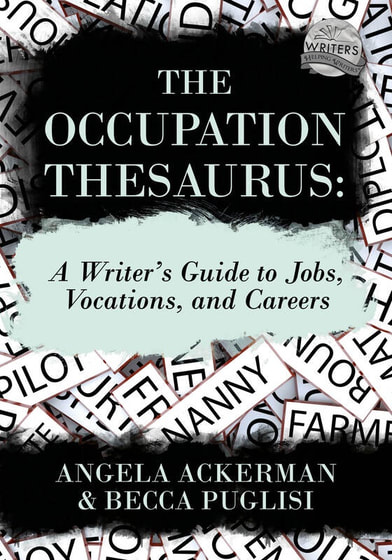
Realistic Character Occupations:
My Experience as a Children’s Author
To win readers over we need to write characters so authentic they feel like real people. How do we do this? By brainstorming a character’s backstory, personality, needs, desires, and their day-to-day world. Lucky for us, one aspect of their daily life is a goldmine of characterization: the type of work they do.
Think about it: a job can reveal personality, skills, beliefs, fears, desires, and more, which is why Angela Ackerman and Becca Puglisi created The Occupation Thesaurus, a writing guide that profiles 124 possible careers and the story-worthy information that goes with each. To help with this project, I’m sharing my experience as a Children’s Author below, in case this career is a perfect fit for your character!
You can find the full list of Contributed Occupation Profiles and check out The Occupation Thesaurus: A Writer’s Guide to Jobs, Vocations, and Careers at Writers Helping Writers.
OCCUPATION: Children’s Author
OVERVIEW:
A children’s author is creative with words, loves children, and wants to encourage, educate and inspire them to be their best possible selves. Their stories reflect the struggle and experiences of today’s children, while incorporating the timeless issues of children throughout the ages.
NECESSARY TRAINING:
Although a Master in Fine Arts is helpful, many children’s authors were former teachers, librarians, nannies, parents or grandparents, who have had much contact with the audience they write for. They need to have a good grasp of their native language, write clearly and creatively and understand the needs, problems and challenges facing their readers. Besides writing every day, children’s authors should read voraciously in the genre they are writing in, and occasionally an opposite genre for variety.
USEFUL SKILLS, TALENTS, OR ABILITIES:
A KNACK FOR LANGUAGES, CREATIVITY, DETAIL-ORIENTED, EMPATHY, GOOD LISTENING SKILLS, MAKING FRIENDS, MAKING PEOPLE LAUGH, MIMICKING, MULTITASKING, NETWORKING, ORGANIZATION, OUT-OF-THE-BOX THINKING, PROMOTION, PUBLIC SPEAKING, READING PEOPLE, RESEARCH, STRATEGIC THINKING, TEACHING, VISION, WRITING, A LOVE OF READING, GOOD COMMUNICATOR.
SOURCES OF FRICTION:
- Feeling competition with those who are more successful in the writing field.
- Feeling a sense of worthlessness if they receive rejections from agents and editors.
- Refusing to ”write for the market” (what the publishers are saying is popular), when they have a great story that might not ”fit.”
- Knowing and being told they are a great writer, but their story doesn't ”fit the current needs of the market.”
- Bookstores refusing to carry their book, since it's not highly publicized or is a ”faith-based” story.
- Their story does not reflect diversity, and thus is not sought after or represented.
- Agent-author relationships can cause friction when there is a lack of communication or effort in submitting the book to publishers.
- Editor-author relationships can suffer when there is miscommunication during the editing process, or a refusal of an author to change words or eliminate characters or scenes for the benefit of the story.
- Writer’s block and a desire to quit when the going gets tough — no contracts or positive feedback.
- Temptation to do work around the house, engage in social media, or anything to distract from writing.
- Encountering technological problems related to computer, software, internet, or loss of digital manuscript.
- A deadline is near, and the editing is not going well, causing panic and frustration.
- Marketing can be daunting for a soon-to-be-published author. Publishing houses don’t have the staff or budget for a publicist to fully engage with each author.
WRITERS SHOULD KNOW. . .
Family members and friends often have no understanding of the needs and struggles of authors.Being a Children’s author can be a lonely job, when there is no networking — having fellow children’s authors to support you and critique your work is paramount. Attending writer’s conferences and connecting on social media is also part of an author’s life.
It’s easy to have FOMO and overtax yourself, leading to career exhaustion. Just because you are not published yet does not mean you cannot call yourself a writer. There will be many days when you don't feel like writing, but you must push ahead.
You can easily become envious of other authors in your genre who seem to have the golden ticket to publishing — they have two books coming out this year (with another on the way), when you have been struggling with rejection letters lately. Professional writer’s organizations like SCBWI are a lifeline for your career.
You’ve heard of a ‘starving artist’? Well, a writing career is no different. Don’t quit your day job just yet — it takes years and dozens of books and outside speaking engagements to equal a full time career.
Have any questions about this job? I’d be happy to answer. Just fill out the form below . . .